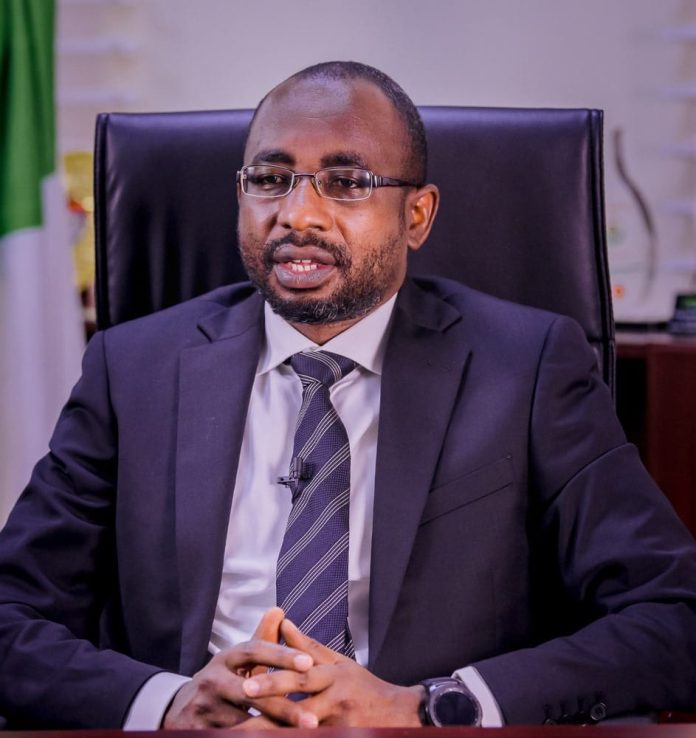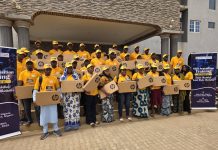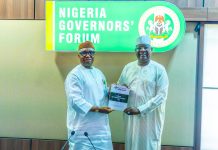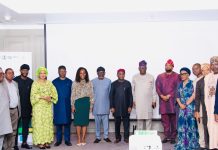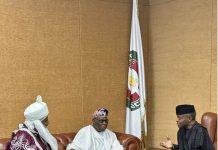The determination to build a new Africa by repositioning Nigeria, the most populous nation in the continent, via Artificial Intelligence and Blockchain technology, is being reinforced yet again. Speaking at the virtual Digital Africa Conference and Exhibition 2021, earlier today, the Director General of NITDA, Kashifu Inuwa Abdullahi, CCIE, was full of confidence in his conviction that Nigeria will lead Africa in its economic diversification.
“Africa, particularly Nigeria, with a growing population and dwindling revenue from oil, have put significant pressure on the economy. There is a need to harness other areas to diversify our economy. Emerging technology is one of these areas, and will play an important role in economic diversification, if properly harnessed,” he proclaimed.
Mallam Abdullahi, who was delivering a goodwill message at the conference themed; ‘Building a New Africa with AI & Blockchain’, stated that digital technologies are changing the world at a faster pace than previously experienced waves of technological innovation. He further clamored for Nigeria, to accelerate growth and modernize its economy through the development of a digital-led growth strategy for the Nigerian economy. “It is pertinent to note that despite the economic shocks due to the COVID-19 pandemic, most of the growth was observed in the economies with viable digital economies,’’ he said.
“Digital economy has been identified as an engine of growth; hence Nigeria can harness it as a driver of growth and innovation,” advised Mallam Abdullahi.

The NITDA boss affirmed that, the WBG Digital Economy for Africa (DE4A) flagship initiative supports the digital transformation strategy for Africa, prepared by the African Union (AU), the DE4A initiative also recognizes that digital economy can help to accelerate the achievement of the UN Sustainable Development Goals (SDGs), and the World Bank Group’s twin goals.
He recounted that recently, a call to action was made with the unveiling of the “Economic Sustainability Plan 2020” which seeks to put technology at the forefront of driving development in Nigeria. “This conference is a meeting point for professionals, practitioners, and policymakers to brainstorm on the best ways of harnessing these technologies to the advantage of the citizenry,” added Mallam Abdullahi.
“For Nigeria, a country in dire need to diversify its economy, digital economic activities are key for diversification because they transcend all aspect of human endeavours and the economic sector,’’ he said.
He asserted that at NITDA, the development and utilization of emerging technologies is one of the strategic pillars for the 2021 -2024 Roadmap and Action Plan. To drive this pillar, he said, is the combined effort of the National Centre for Artificial Intelligence and Robotics (NCAIR) and Office for Nigeria Digital Innovation (ONDI) both subsidiaries of NITDA.
“We are already collaborating and will always be willing to partner with stakeholders and researchers to bring AI, Blockchain, and other emerging technologies to support our economic diversification and sustainability plan for the country,” DG affirmed.
He reiterated that, the focus on the economic advancement of Sub-Saharan Africa, leveraging emerging technologies, specifically; AI, Blockchain, IoT, and 5G is highly commendable, apt and timely.
He finally urged stakeholders present at the event to make necessary partnerships and collaborations towards making Nigeria a leading knowledge and digital economy by 2030.
Accordingly, he commended the Digital Africa, organizers of the conference for their commitment to the cause of building a digital economy for Africa.
The keynote speaker of the event, Prof. Umar Garba Danbatta, Executive Vice Chairman of NCC, in his speech, nudged Africa in taking advantage of the unprecedented quantities of data, now being generated on sentiment, behaviour, human health, commerce, communications, migration and more.
“Adoption of AI solutions is expected to increase tremendously in the next few years and competition among major AI companies is expected to be intense,” said Prof. Danbata.
He noted that, in a recent report published by Markets and Markets (M&M), the global AI market size is projected to grow from 58.3 billion dollars in 2021 to 309.6 billion dollars by 2026, it is a compound of enormous growth rate of 39.7% during the forecast period.
He explained that BlockChain is the foundation for crypto currency such as bitcoin; one of the newest technologies that has received extensive global attention in recent times. BlockChain serves as an immutable measure which allows transactions take place in addition to a live manner. BlockChain based applications are springing up, covering numerous fields including financial services, refutation systems, Internet of Things (IoT), health and so on.
Prof. Danbata made reference to the ‘Emergent Research’, a research consulting firm forecast on small businesses, projected that the global BlockChain market of 180.7 million dollars in 2019 is anticipated to reach 1.12 billion dollars by the year 2027. It is a compound growth rate of 25.6%. One major implication of this revelation is that a robust and reliable broadband infrastructure and advanced technology, such as the 5th Generation Network (5G), are required to unleash the huge economic potentials of AI and BlockChain in every country.
Prof. Danbata posits that Africa, and indeed Nigeria, must be positioned to take advantage of this huge revenue in AI technologies, BlockChain especially, in the next 5 years to enable a digital economy.



